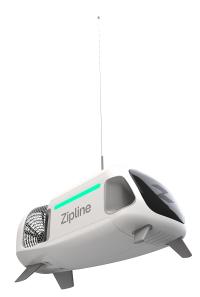Drone delivery company Zipline unveiled its next-generation aircraft Wednesday along with several health systems stepping up to be first in flight.
Zipline is calling its new drone system Platform 2, or P2. The new drones can carry twice the weight of Platform 1 and are ideal for home deliveries. Michigan Medicine, Intermountain Health and MultiCare Health System are all taking advantage of the move to localized delivery to bring medications and medical devices to patient homes.
“We estimate that when Zipline launches, most of our patients will be able to have their prescriptions delivered in just a few minutes,” said Marschall Runge, M.D., Ph.D., CEO of Michigan Medicine and executive vice president of medical affairs for the University of Michigan, during a press conference. “And that is an absolute game changer for people with conditions like diabetes where going without medication for even an hour can turn serious.”
Michigan Medicine expects that with the use of Zipline’s new drone delivery service, the medical system will be able to more than double the number of prescriptions filled annually through its in-home pharmacy. The move is part of UM Health’s goal of increasing patient access to specialty pharmacy services, executives said.

MultiCare announced plans to use P2 to deliver prescriptions and medical devices along with expediting diagnostics throughout MultiCare’s network. The health system currently includes 12 hospitals and numerous laboratories and provider offices. The health system first partnered with Zipline in July 2022 to deliver medical products to MultiCare facilities.
Intermountain will use Zipline’s P2 to deliver prescriptions to patients’ homes in the Salt Lake City metro area. Intermountain first rolled out drone delivery service with Zipline in October 2022. The fix-wing drones first delivered specialty pharmaceuticals and certain over-the-counter medications in South Jordan, Utah.
In the initial phase, Intermountain covered the costs of drone delivery but expected the costs to be no more expensive than ground delivery. These P1 distributions used small parachutes to drop deliveries, while P2 uses a lowered hovering mechanism that allows for more targeted delivery.
“In the U.S., we're already working with some of the most innovative health systems, retailers and restaurants,” said Deepak Ahuja, Zipline chief business and financial officer, during a press conference. “During the pandemic, we saw a dramatic increase in telehealth. The digital solutions to support decentralized care have come a long way. But the physical systems are still lagging.”

P2 has a much smaller service radius at 10 miles, compared to P1’s 120-mile round-trip capabilities. P2 drones use simplified loading portals to send materials as compared to P1 which requires Zipline distribution hubs.
P2 travels seven times faster than a car and utilizes its own autonomous airspace deconfliction tool, recently approved for usage in the U.S.
The drone company first began its work in Rwanda delivering blood. A follow-up study in the Lancet found that Zipline’s service resulted in a 67% reduction in blood wastage across Rwanda. Use of the drones in the east African country also led to an 88% decrease in hospital maternal deaths due to postpartum hemorrhage.
During the press conference announcing P2, Zipline co-founder and CEO Keller Rinaudo Cliffton spoke with President of Rwanda Paul Kagame. Cliffton mentioned that at the time of launching, experts said the 15-person company was on a foolhardy mission. Kagame, Cliffton said, was the first to take a chance on the company. “Why did you do that?” Cliffton asked.
“If look at even our history and where we have come from, it has been that of a lot of difficulties, but we also understand we have to do things and move on,” Kagame said. “So as much as it looked too difficult from the beginning, doing what we did together, we thought we needed to try. And we're looking at three things really coming together. It's about people. It's about technology. It's about the innovation in between to make things work to improve people's lives.”
Today, Zipline delivers 75% of Rwanda’s blood supply outside the capital of Kigali. Zipline drones now serve 3,400 health centers and over 45 million people.
The company is planning to complete about 1 million deliveries by the end of 2023. By 2025, the company hopes to operate more flights annually than almost all major U.S. airlines.
In 2022, Zipline gained the first FAA Part 135 approval for long-range deliveries. The company claims to reduce carbon emissions of deliveries by 97% when compared to gas cars. Zipline drones now fly in seven different countries and three U.S. states. In 2024, the company plans to begin operations in Michigan and Washington with more states to follow.